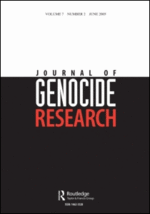Cultural Genocide
When Raphael Lemkin coined the term genocide during World War II, he initially had a broader idea of the concept, namely that a group could be effectively destroyed by an attack on its social institutions and cultural heritage, even without the physical obliteration of its members. Since Lemkin, scholars have defined cultural genocide as a form of persecution involving the deliberate destruction of the culture of a people, ranging from violence against material and immaterial culture to assaults on identities of groups. Such destruction is wrought in a variety of ways, typically including restrictions upon of a group's language and traditions, the use of boarding schools to forcibly assimilate children, the ruination of objects and institutions, and the persecution of political, cultural, intellectual, and religious elites.
History abounds with examples of cultural genocide. The expansion of Europe from 1492 on, for example, can be read as a long process of (un)intended destruction of indigenous cultures on the American and Australian continents. Other examples include the Russian colonization of the Caucasus, Chinese rule in Tibet, the Japanese occupation of Korea, Nazi policies in occupied Poland, Young Turk cultural policies in Eastern Turkey, and the destruction of Islamic architecture in Bosnia. How can cultural genocide be conceptualized? Why do political elites launch policies to eradicate cultures? How effective are these policies? To what degree are processes of nation formation tantamount to cultural genocide?
This thematic issue of the Journal of Genocide Research aims to contribute to our understanding of cultural genocide. The editors welcome original and innovative articles dealing with all possible aspects of cultural genocide. After initial editor screening, all submissions will undergo peer review. Proposals (max 1.5 pages) for papers should be submitted together with a short curriculum vitae by 1 March 2009 both to the editors of the JGR
Dominik J. Schaller (dominik.schaller@uni-heidelberg.de)
Jürgen Zimmerer (j.zimmerer@sheffield.ac.uk) and to the guest editor ugur.ungor@gmail.com
The articles, which should be a maximum of 8500 words including documentation, will be due on 1 July 2009.
JOURNAL OF GENOCIDE RESEARCH
INTERNATIONAL NETWORK OF GENOCIDE SCHOLARS
Tuesday, January 20, 2009
Cultural Genocide: Call for Papers for Journal of Genocide Research
Contribute to Indigenous People's Issues Today
Please send it along and we will do a feature. Email it to the Editor, Peter N. Jones: pnj "at" bauuinstitute.com.
Indigenous Peoples Issues and Resources
Privacy Policy for Indigenous Peoples Issues Today (http://indigenousissuestoday.blogspot.com)
The privacy of our visitors to Indigenous Peoples Issues Today is important to us.
At Indigenous Peoples Issues Today, we recognize that privacy of your personal information is important. Here is information on what types of personal information we receive and collect when you use visit Indigenous Peoples Issues Today, and how we safeguard your information. We never sell your personal information to third parties.
Log Files
As with most other websites, we collect and use the data contained in log files. The information in the log files include your IP (internet protocol) address, your ISP (internet service provider, such as AOL or Shaw Cable), the browser you used to visit our site (such as Internet Explorer or Firefox), the time you visited our site and which pages you visited throughout our site.
Cookies and Web Beacons
We do use cookies to store information, such as your personal preferences when you visit our site. This could include only showing you a pop-up once in your visit, or the ability to login to some of our features, such as forums.
We also use third party advertisements on Indigenous Peoples Issues Today to support our site. Some of these advertisers may use technology such as cookies and web beacons when they advertise on our site, which will also send these advertisers (such as Google through the Google AdSense program) information including your IP address, your ISP, the browser you used to visit our site, and in some cases, whether you have Flash installed. This is generally used for geotargeting purposes (showing New York real estate ads to someone in New York, for example) or showing certain ads based on specific sites visited (such as showing cooking ads to someone who frequents cooking sites). Google, as a third party vendor, uses cookies to serve ads on this site. Google's use of the DART cookie enables it to serve ads to users based on their visit to sites on the Internet. Users may opt out of the use of the DART cookie by visiting the Google ad and content network privacy policy.
You can chose to disable or selectively turn off our cookies or third-party cookies in your browser settings, or by managing preferences in programs such as Norton Internet Security. However, this can affect how you are able to interact with our site as well as other websites. This could include the inability to login to services or programs, such as logging into forums or accounts.
Thank you for understanding and supporting Indigenous Peoples Issues Today. We understand that some viewers may be concerned that ads are sometimes served for companies that negatively depict indigenous peoples and their cultures. We understand this concern. However, there are many legitimate companies that utilize Google Adwords and other programs to attract visitors. Currently, we have no way of deciphering between the two - we leave it up to the viewer to decide whether the companies serving ads are honest or not.


No comments:
Post a Comment